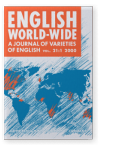Vol. 21:1 (2000) ► pp.1–23
Rhyming slang world-wide
Homegrown or imported?
Rhyming slang (RS) sprang to life in mid-19th century London when it was first recorded by Ducange Anglicus (1857) together with other unusual forms of slang, such as back slang and Polari. In the period of extensive British emigration to the United States, Canada, South Africa, Australia and New Zealand, this special type of lexis was also carried around the world — though in much less regular distribution than might have been expected on the basis of shared socioeconomic colonial histories. Three types of development were possible:
1. individual RS items might survive (and possibly acquire new meanings);
2. they might die out, leaving a historical record of their extraterritorial existence at best;
3. they might prompt local fashions, imitating the pattern but creating new words.
The phenomenon of RS has found various references in books on national Englishes (such as those by Baker (1970), but significantly less so in Ramson (1966) and Mencken (1977)); however, it has never been explored on a contrastive level. Such an approach has become more feasible today now that the set of historical dictionaries of English is complete following the publication of the works edited by Silva (1996), Ramson (1988) and Orsman (1997) — even though slang is badly documented, since it was not always considered worthy of inclusion in general dictionaries.
Cited by
Cited by 4 other publications
This list is based on CrossRef data as of 29 march 2024. Please note that it may not be complete. Sources presented here have been supplied by the respective publishers. Any errors therein should be reported to them.
